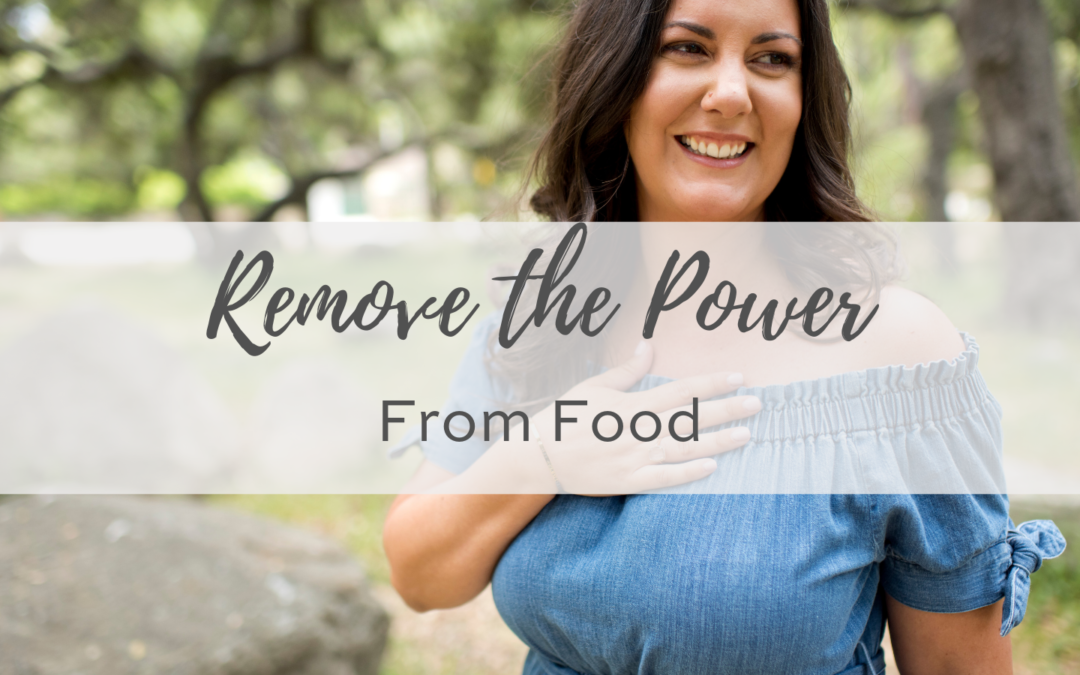REMOVING THE POWER FROM FOOD
So many of us give food too much power. We think a healthy choice will lead to weight loss, or one unhealthy choice might cause cancer. We fail to listen to our bodies because we believe there is so much power behind every bite and every decision we make. In reality, however, there are many factors involved in health, including stress, emotional health, spiritual health. This is why we need to step back and rely on our body’s wisdom to tell us what we need.
When we give food too much power, we constantly judge what we’re putting in our mouths. We try to consume what we are told will heal us and avoid food we are told will make us sick. Yes, food can be used as medicine and to help soothe ailments, but our health is not determined by one day or one meal. How many times have you heard the story of the runner who always ate healthy but died suddenly from a heart attack? Or the story of the grandmother who ate sweets every day and lived to ninety-nine? Stress and worry don’t keep us healthy or happy. Eating should be full of pleasure and be stress-free, regardless of how our plates look.
When you believe the food is stronger than you, your mind may race all day long. Each moment your brain says, “I am not going to eat that” and is constantly testing your willpower. When you finally give in and eat that cookie or brownie or ice cream, your mind calms down. It doesn’t have to race anymore because you gave it a break. This was not a willpower problem with food. Part of removing the power from food is taking time to center yourself and calm your overwhelmed brain, not exhausting your will- power with beliefs and systems that don’t support what your body needs.
IDENTIFY YOUR EMOTIONAL BAGGAGE
We carry with us the stories that we don’t let go of. They can be stories of personal shame, the loss of a loved one, a com- ment someone made, or a time we were wronged. These stories can get heavy to carry. The mistake in making any changes, food and exercise included, is that we skip the step where we identify the stories, forgive them, and let them go. Holding on to them keeps us in a space of reliving the emo- tions. It limits our energy resources as we shift into a new way of living. Carrying around these unproductive feelings and allowing them to fester hurts no one except ourselves.
PARENTAL BLAME
One common concern my clients face is anger or frustration in how their parents raised them and how this has resulted in issues with food. One mother locked up food to prevent her child from snacking. Another child was home alone every day after school and turned to food as a source of comfort because she was scared. It would be understandable for these people to blame their parents and think their lives would be better now had those problems not occurred.
Asking the right questions can help us reframe this belief. “Is that true? How do you know your life would be perfect?” If the situation had been different, the assumption is no other problems would have existed. When you are honest with yourself, you know times of strength and growth have come through struggle. Had things been different, your life could have been better, but it also could have been worse. Making assumptions only toward the positive makes resentment harder to let go of. The truth is, without that issue, another worse problem could have surfaced. Empathy and compassion doesn’t mean the pain was OK; it means you can heal by seeing through another’s eyes. Why did your parents act a certain way? What was their life like growing up? Trust they did the best they could with what they had or knew at the time.
Give your parents credit for the good as well as the bad. You are who you are today because of the lessons they taught you, even the “negative” ones. If your mom was selfish, maybe you learned to be empathetic and take others’ feelings into consideration. Regardless of whatever story your parents gave you, you control the choices you make in the present moment. Taking responsibility for what you’re doing and where you’re going is empowering. You did not have control over how things played out growing up, but now it is yours to own. You have free will. You get to choose who you will become.
Some people can let go of their stories easily and move on. For others, the struggles may go deeper. If you don’t feel safe as your issues rise to the surface, I recommend you reach out to a licensed therapist for help. Some people can go through an exercise with me, write it out, release it, and feel better. For others, the task may be far more emotionally draining. As you explore your own deeper-seated issues, be mindful of how much the process is taking out of you and consider whether you need additional support.
SPOUSAL CONCERNS
Expressing feelings of anger or resentment toward a spouse or partner for not helping enough or not showing affection can show up in your food or body story. One woman turned to food instead of having a confrontation with her husband over her needs going unmet. Another binged at the end of each day because she was exhausted from running around and maintaining the home. It can feel easier to avoid discussions with our partners, yet this can lead to shutting down and turning to food for comfort.
When you want to feel accepted, loved, and heard, it is time to go within and decide what part is an internal problem to solve and what part is about communication and asking for help. Let’s not assume the other person knows what you need. Self-responsibility is letting go of expectations of how something should be and instead of accepting it as it is. From this place, you can decide where you have control to change the routine and where you can ask for help.
There are always options. We are not victims. In fact, I know you know just how powerful you are. The first five years of my marriage, my husband was off at work, out with friends, going sailing, and playing soccer. It seemed he would do anything to be out of the house, and I was angry because I wanted him to want to be home more. I became more angry and lonely the more I asked him to be home and spend time with us. The more I wanted it, the more he resisted. I dug deep and decided to find what I needed within. I took responsibility for my own happiness. I started a business. I made more playdates with moms. I went out for fun without him. I started to feel fulfilled and enjoyed the times when he was out of the house. The result was, he wanted to be home more. He saw the shift in me, and it shifted something inside of him. Even if he hadn’t changed, I had made the choice to still be happy. The answer was inside of me all along. It is for you as well.
CONSTANT COMPARISON
If you face jealousy and constant comparison with friends, turn it into a positive force.
Elisa always said, “I have this friend who always looks perfect and dresses to the nines. She’s always in shape and eats whatever she wants, and I wish I could be like her.” In this case, I asked her to shift her focus. Why was she drawn to that person? Was it her confidence? Was she accomplished and challenging herself to learn things? Was she well-connected because she put herself out there? Typically, jealousy is about something internal that you need to cultivate and draw out.
Remember, you don’t always know what’s going on behind closed doors. At the eating disorder clinic, we had women of all ages and sizes sitting around doubting themselves and wishing they were like others in the room. They said things such as, “I wish I had your control. I wish I could light up a room like you and make everyone feel happy.” Maybe your friend doesn’t eat dessert, but when she goes home, does she have a good relationship with her husband? What’s going on in her family and in her head? Do you want that person’s life, their whole life? My guess is no. When you think of trading lives—not just bodies—you start to realize all the amazing things you’d be forced to give up, because you can’t have just their body and keep your life. You love your own life, so love who you are and the body you live in that helped create it.
Working in the clinic made me more empathetic, which in turn allowed me to live a calmer life. I remember I went into lunch at the center one day and one girl became very upset over a comment I made. She still felt rage from a fight she’d had with her mother the night before. Because I was there representing the food she needed to eat, her anger turned toward me. “I want to throw this plate at your head,” she said. I didn’t take it personally. I knew the back- story that led up to that comment, and we worked through it. Later that day, I went to Whole Foods to pick up dinner, and a man was yelling at the cashier in frustration about the wait. Usually, I would think to myself that he was being rude, but I had thought back to the girl at the clinic. What had happened to this man that led up to that moment that he exploded and yelled at the cashier? I didn’t know his story. His behavior wasn’t necessarily acceptable, but I was able to handle the situation with love and compassion.
Do the same for yourself.


